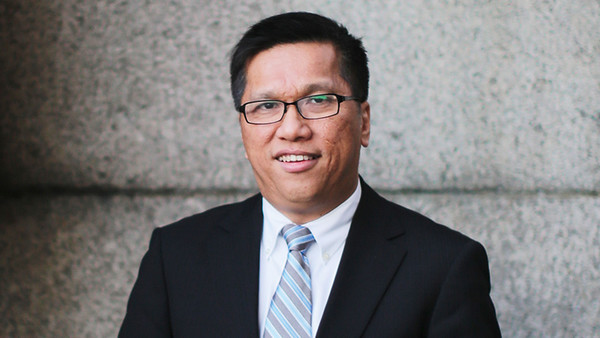(单词翻译:单击)
It was almost 28 years after Kalok Chan left the Chinese University of Hong Kong as a fresh-faced graduate that he returned to its business school in 2014.
从陈家乐(Kalok Chan)面带稚气地从香港中文大学(CUHK)毕业,到他在2014年重返该校商学院,时间已经过去了近28年。
This time it was not as a student or even a professor, but as its newly appointed dean. “It was like returning home,” says the amiable finance professor.
这次陈家乐既不是当学生,甚至也不是当教授,而是作为新任命的院长走马上任。这位和蔼的金融学教授表示:“这就像回家一样。”

The offer of the deanship at the school was not the first time CUHK had tried to lure Prof Chan back to teach at his alma mater. “When I finished my PhD [in finance at Ohio State University] I had an offer from CUHK but stayed in the US,” he says. “I wanted to do serious research and US schools provided a very good research environment. I spent six or seven years in the US before going back to Hong Kong.”
邀其出任商学院院长,并不是香港中文大学第一次请陈家乐重返母校。他说:“当我攻读完(俄亥俄州立大学(Ohio State University)金融学)博士学位的时候,我就收到了香港中文大学的邀请,但我留在了美国。我想做严肃的研究,而美国商学院提供了非常好的研究环境。我在美国呆了六、七年后,才回到香港。”
It was this focus on serious academic research that informed and guided Prof Chan’s academic career. He has an enviably long list of publications in prestigious financial journals to his name, on esoteric topics from liquidity to trading strategies and emerging stock markets. So when he decided to return to Hong Kong it was to work at the business school at Hong Kong University of Science and Technology (HKUST), which had set out to attract US and European-trained scholars to Hong Kong with the promise of a US-style research environment.
正是这种对严肃学术研究的专注,启迪和指引着陈家乐的学术生涯。他在权威金融期刊上发表了令人羡慕的一系列文章,涉及各种深奥的题材,从流动性、交易策略,到新兴市场的股市。因此,当他决定回到香港的时候,他的目的地是香港科技大学(HKUST)的商学院,该校想方设法吸引接受过美国和欧洲培训的学者来到香港,承诺为他们提供美国式的研究环境。
Prof Chan admits that at the time CUHK could not compete in attracting elite scholars. It was a course CUHK did not begin to follow until 2000, says Prof Chan. “[In] the last 10–15 years things have changed bit by bit. In the old days, CUHK was more an institution focused on teaching. Now it has built a research programme and recruits faculty with strong research interests.”
陈家乐承认,那时香港中文大学在吸引精英学者方面没有竞争力。他表示,香港中文大学直至2000年才开始效仿。“在过去的10至15年期间,情况逐步改变。之前香港中文大学更注重授课。现在它建立了研究项目,招聘了具有浓厚研究兴趣的教学团队”。
HKUST combined its aggressive approach to recruiting internationally trained faculty, many of whom had ties to Hong Kong, with developing joint programmes with globally ranked schools — the Kellogg school at Northwestern University in the US is perhaps the most notable. It is a strategy that Prof Chan now hopes to implement at CUHK.
香港科技大学一方面积极招聘受过海外培训的师资(其中许多人与香港有联系),另一方面与登上全球商学院排行榜的商学院发展联合课程——美国西北大学凯洛格商学院(Northwestern University: Kellogg)或许是其中最著名的。陈家乐现在希望在香港中文大学也实施这一战略。
This global perspective is a far cry from Prof Chan’s undergraduate days at the school. “In the old days, as the name of the university implies, the medium of tuition was Chinese,” he says. Now the school’s undergraduate, masters, MBA and doctoral programmes are all taught in English.
这种全球视角与陈家乐在该学院就读本科时大不相同。他说:“在过去,正如这所大学的名字所暗示的那样,教学的媒介就是中文。”现在该学院的本科生、研究生、MBA和博士课程全都用英文教学。
The only Chinese-language programme is the Chinese executive MBA. “We’re targeting it at the Chinese executive who has not had access to an English language education but still has a strong interest in understanding the world of business,” says the dean.
唯一使用中文教学的课程是中国高管MBA。陈家乐表示:“我们将该课程的目标学员定位于那些没有接受过英语教育、但仍有强烈兴趣了解商业世界的中国高管。”
But the early focus on China has brought advantages to the school, believes Prof Chan. While other Hong Kong schools are trying to establish links with China, CUHK already has two well-established programmes there — a masters degree in accounting taught in Shanghai and a finance MBA taught in Beijing and Shenzhen, the latter taught jointly with the prestigious Tsinghua University.
但陈家乐相信,较早把目光投向中国内地市场给该学院带来了优势。在香港其他商学院试图与中国内地建立联系之际,香港中文大学已经在中国内地有了两个成熟的项目,一个是在上海授课的会计硕士学位,另一个是与知名的清华大学(Tsinghua University)合办、在北京和深圳授课的金融MBA学位。
Now the plan is to establish relationships with business schools in the US and Europe. The aim, says Prof Chan, is to “bring together schools from the east and the west”.
现在,香港中文大学的计划是与美国和欧洲的商学院建立合作关系。陈家乐表示,目标是“将东、西方的商学院结合起来”。
The irony is that when Prof Chan was head of the finance department at HKUST he was instrumental in establishing one of its highest-profile joint programmes — the master of science in global finance, taught jointly with NYU Stern.
讽刺的是,当陈家乐担任香港科技大学金融系主任的时候,他帮助建立了该校最著名的联合课程之一——与纽约大学斯特恩商学院(NYU Stern)合作教学的环球金融学硕士课程。
Prof Chan is the first to acknowledge that establishing such programmes will be more difficult than in “the old days”. There is strong local competition and universities from outside the region are moving in, as they see the opportunities. “There are a lot more schools in the region and a lot more schools with this research focus,” he says.
陈家乐坦承,今后创办此类课程将比“过去”更为困难。本地商学院竞争激烈,同时香港以外的大学正进军香港,因为他们看到了机遇。他表示:“香港的商学院更多了,而且专注于研究的商学院也更多了。”
Many western institutions are looking for alliances in mainland China, but the CUHK dean believes Hong Kong has distinct advantages: the system is much more in line with that of the US or the UK, and there is freedom in pay scales and course design. “There is a lot of political influence in education in China,” he says.
许多西方商学院正寻求与中国内地建立合作伙伴关系,但陈家乐相信,香港具有独特的优势:其教育体系与美国或英国的体系更加合拍,薪酬水平和课程设计也比较自由。他说:“中国内地的教育受到不少政治上的影响。”
In many ways the challenges faced by Prof Chan are very similar to those faced by a dean in Canberra, Cambridge or Connecticut. The flagship MBA programme, like those almost everywhere in the world, is under pressure. While on the topic of research, he talks of balancing the needs of the local community with the needs for a global research agenda, and the debate on relevance and rigour, in much the same terms as any global business school dean.
从许多方面来说,陈家乐面临的挑战与堪培拉、剑桥或康涅狄格的商学院院长面临的挑战非常类似。与世界上几乎所有地方的商学院一样,该校的旗舰MBA课程正承受压力。就研究课题而言,他基本和全球任何商学院院长一样,都谈到了平衡当地社区与全球研究议程的需求,以及有关相关性和严谨性的辩论。
There is, however, one issue where Prof Chan has a clear advantage over his peers: because a substantial chunk of the school’s funding comes from government — the four-year undergraduate programme, for example, is free of charge to local students — and with the Hong Kong economy in good health, financial support is strong.
然而,陈家乐与同行相比有着一个明显的优势:该商学院的很大一块资金来自政府——例如,为期四年的本科课程对本地学生是免费的——而且由于香港经济健康,该校获得的财务支持非常强大。
“My priority is to improve the school and its programmes,” concludes Prof Chan. “Fundraising is not my short-term priority.”
陈家乐总结道:“我的优先事项是改善学院及其课程。筹资不是我在短期内会关注的重点。”
-------------------------------------------
-------------------------------------------
Kalok Chan
陈家乐
Following his PhD at Ohio State University, Kalok Chan worked in the US before returning to Hong Kong to join Hong Kong University of Science and Technology’s finance department, of which he later became head. In 2014, he moved to the Chinese University of Hong Kong, where he previously studied as an undergraduate, as dean of the business school.
在俄亥俄州立大学攻读完博士学位之后,陈家乐先是在美国工作,随后回到香港,加入香港科技大学金融系,后来担任该系主任。2014年,他来到自己的本科母校——香港中文大学,担任该校商学院院长。
A finance professor through and through, Prof Chan has played a role on several public bodies in Hong Kong, including the Asian Finance Association, where he was president from 2008 to 2010. He has also served on committees, including the Hang Seng Index Advisory Committee and Hong Kong Housing Authority.
陈家乐是一名地地道道的金融学教授,他在香港的数家公共机构任职,包括从2008年到2010年在亚洲金融协会(Asian Finance Association)担任会长。他还服务于多个委员会,包括恒生指数顾问委员会(Hang Seng Index Advisory Committee)和香港房屋委员会(Hong Kong Housing Authority)。


